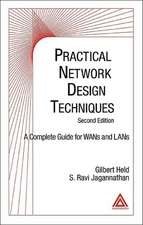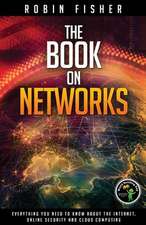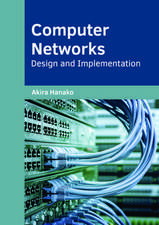IP Routing Protocols: Fundamentals and Distance-Vector Routing Protocols
Autor James Aweyaen Limba Engleză Paperback – 26 mai 2021
- Focuses on the fundamental concepts of IP routing and distance-vector routing protocols (RIPv2 and EIGRP).
- Describes the various methods used by routers to learn routing information.
- Includes discussion of the characteristics of the different dynamic routing protocols, and how they differ in design and operation.
- Provides detailed descriptions of the most common distance-vector routing protocols RIPv2 and EIGRP.
- Discusses the various mechanisms IP routers use for controlling routing in networks.
| Toate formatele și edițiile | Preț | Express |
|---|---|---|
| Paperback (3) | 533.31 lei 43-57 zile | |
| CRC Press – 26 mai 2021 | 533.31 lei 43-57 zile | |
| CRC Press – 26 mai 2021 | 534.77 lei 43-57 zile | |
| CRC Press – 26 mai 2021 | 546.39 lei 43-57 zile | |
| Hardback (3) | 1251.98 lei 43-57 zile | |
| CRC Press – 26 mai 2021 | 1251.98 lei 43-57 zile | |
| CRC Press – 26 mai 2021 | 1257.78 lei 43-57 zile | |
| CRC Press – 26 mai 2021 | 1352.83 lei 43-57 zile |
Preț: 533.31 lei
Preț vechi: 666.63 lei
-20% Nou
Puncte Express: 800
Preț estimativ în valută:
102.06€ • 106.02$ • 84.78£
102.06€ • 106.02$ • 84.78£
Carte tipărită la comandă
Livrare economică 03-17 februarie 25
Preluare comenzi: 021 569.72.76
Specificații
ISBN-13: 9780367709624
ISBN-10: 0367709627
Pagini: 324
Ilustrații: 35 Line drawings, black and white; 59 Halftones, black and white; 2 Tables, black and white; 94 Illustrations, black and white
Dimensiuni: 156 x 234 x 17 mm
Greutate: 0.45 kg
Ediția:1
Editura: CRC Press
Colecția CRC Press
ISBN-10: 0367709627
Pagini: 324
Ilustrații: 35 Line drawings, black and white; 59 Halftones, black and white; 2 Tables, black and white; 94 Illustrations, black and white
Dimensiuni: 156 x 234 x 17 mm
Greutate: 0.45 kg
Ediția:1
Editura: CRC Press
Colecția CRC Press
Public țintă
Academic and Professional Practice & DevelopmentCuprins
1. Introduction to IP Routing Protocols. 2. Types of Dynamic Routing Protocols. 3. Routing and Forwarding Tables in Routing Devices. 4. Static Routes in the Routing Table. 5. Routing Information Protocol (RIP). 6. Enhanced Interior Gateway Routing Protocol (EIGRP). 7. Network Path Control and Factors that Affect Routing Table Properties.
Notă biografică
James Aweya, PhD, is a chief research scientist at the Etisalat British Telecom Innovation Center (EBTIC), Khalifa University, Abu Dhabi, UAE. He has authored four books including this book and is a Senior Member of the Institute of Electrical and Electronics Engineers (IEEE).
Descriere
This book focuses on the fundamental concepts of IP routing and distance-vector routing protocols (RIPv2 and EIGRP). It discusses routing protocols from a practicing engineer’s perspective, linking theory and fundamental concepts to common practices and everyday examples.










